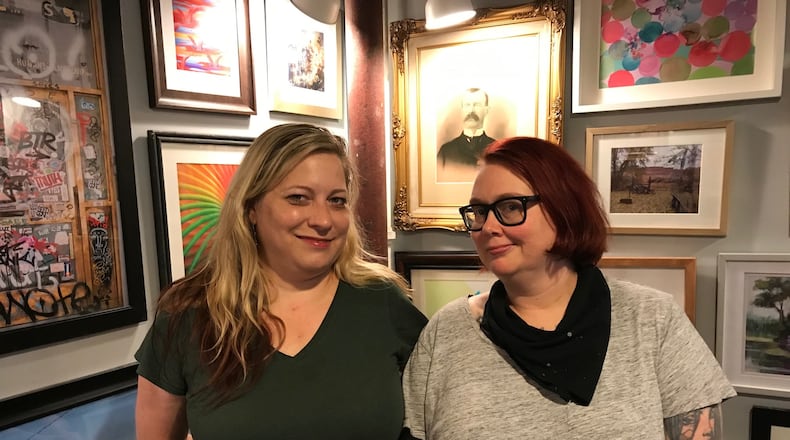Originally posted June 24, 2019 by RODNEY HO/rho@ajc.com on his AJC Radio & TV Talk blog
With the backlash over Georgia’s “heartbeat” abortion law, female crew members are leading the charge on the ground level to convince producers and actors to stay in the state.
They are signing petitions, writing letters and raising funds for groups battling to keep the law from being enacted.
For the past 11 years, TV and film production has seen steady and often spectacular growth in Georgia. This year was looking no different to the tens of thousands of workers on the ground.
Thousands of people each year have been entering the entertainment business in the state, building props, doing makeup, cooking meals, negotiating film sites and rental homes for out-of-state actors. New studios steadily opened up. New TV shows and films kept coming in.
"There was a certain amount of complacency," said Sara Riney, who has done set decoration over the past decade for AMC's "The Walking Dead," NBC's "Good Girls" and DC Universe's "Doom Patrol." "We were all making money trusting this would all keep going."
But then the Georgia legislature in March passed a highly restrictive anti-abortion signed into law in early May by Gov. Brian Kemp.
Riney said she and others were caught off-guard by this development. The law’s passage and possible enactment next year led actors and producers to call for a boycott of the state. Several film and TV productions pulled out and major studios are threatening to leave if the law actually happens in 2020.
Stacey Abrams - who lost the gubernatorial race in November by a slim margin - has been championing an effort to "stay and fight."
Female crew members such as Riney, production designer Molly Coffee and camera operator Callie Moore are taking the same tact, attempting to organize ground-level workers and place pressure on Hollywood not to abandon ship.
“There is a danger aligning too close to Stacy,” Coffee said. “We want to make this a bipartisan movement. It’s more about the work and the economic impact. We don’t want it to go away.”
Many crew members, she noted, are Republicans and super conservative.
Jaime Rosengren, an on-set dresser, made the first move after the bill passed the legislature and Alyssa Milano was the first actor to call for a boycott. She collected signatures from 60 crew members - most of them women - and asked studio heads to publicly oppose the bill.
About two-thirds of the crew members who signed a letter asking production companies to oppose the bill in March were women.
But Rosengren received studious silence until Kemp signed the bill and backlash began in earnest.
Credit: RODNEY HO/rho@ajc.com
Credit: RODNEY HO/rho@ajc.com
Moore, a camera operator from South Carolina, got her start in New Orleans, which had plenty of work in the 2000s. Since coming to Atlanta in 2016, she’s noticed the growth in female camera operators, which now make up more than 20 percent of the pool in Georgia, she said. “I bought a house here,” she said over coffee in Oakhurst. “I love it here!”
After the boycott calls happened, she created a website to raise money with the help build grassroots support and distributed stickers.
She first wanted to use the phrase "stand and fight" but the NRA had it. So she opted for www.stayandfightgeorgia.com, which has raised $15,000.
“We don’t need folks from Los Angeles telling Georgians what to do,” Moore said. “It’s a very personal issue. This isn’t just our livelihood but it’s about women’s rights and knowing this is the wrong thing to do. All this money is coming out of our pockets, of people who live here.”
Coffee, who also rents artwork for sets to use and launched a non-profit to nurture independent filmmakers, is homegrown talent and truly indebted to the tax credits.
“I have my GED,” Coffee said. “I didn’t go to college. But I’m a department head in this industry with health insurance. It’s insane! There’s not a lot of industries I would have this much success.”
Before Riney jumped into the business, she was just getting by. “I wouldn’t own a house,” she said. “I was hustling. I was working all kinds of jobs. I had five different jobs. It was killing me.”
Coffee said there are certainly creative types who live in Los Angeles and would like any excuse to bring more work back to their home.
She is going directly to producers of the TV shows and movies "to make our cases armed with the information about the work being done here," she said. Some producers such as J.J. Abrams and Jordan Peele have committed to staying and providing money to groups fighting the abortion bill.
Still, the boycott might have an impact later in the year and into 2020. In effect, they won’t know what they’re missing because some producers may just to take Georgia off the list of potential filming sites up front.
And the Georgia legislature is a wildcard in 2020. With Kemp demanding cutbacks in agencies in anticipation of an economic slowdown, the tax credits - which are uncapped - might get more scrutiny. The growth of the industry has largely happened while the state’s economy has been on a roll and the lost tax revenue hasn’t been noticed.
They hope to have an infrastructure in place to anticipate any blowback so they won’t be so flatfooted in the future.
About the Author
Keep Reading
The Latest
Featured




